Death and Dying: Understanding the Concept and its Aspects
VerifiedAdded on 2023/01/13
|11
|3463
|42
AI Summary
This report provides an in-depth study of the concept of death and dying, covering various aspects such as where people die, the Kubler-Ross model, dying experience, denial of death thesis, criticism of denial of death, bereavement and mourning, and more. It explores the different perspectives and experiences related to death and dying in the UK and highlights the social distribution of grief.
Contribute Materials
Your contribution can guide someone’s learning journey. Share your
documents today.
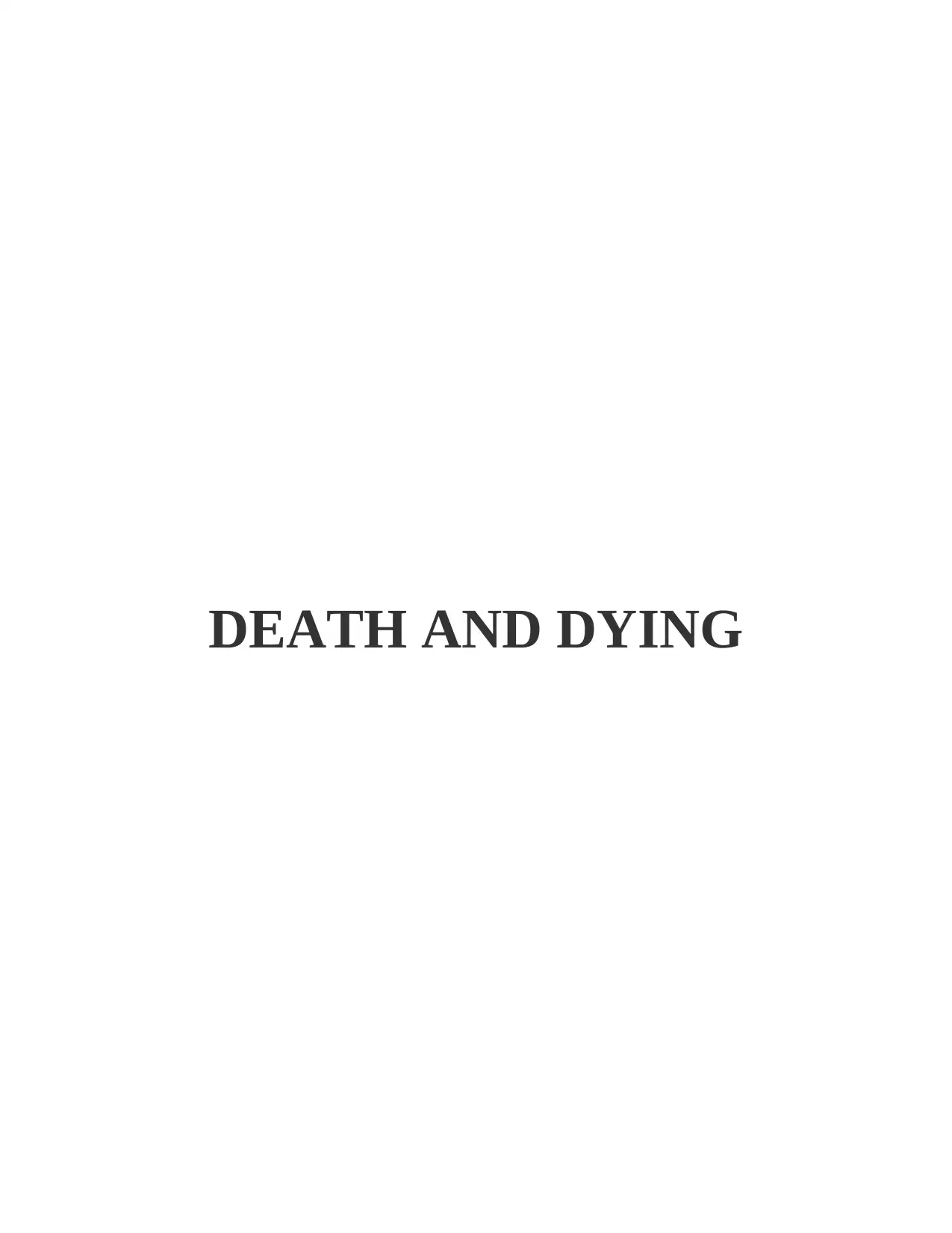
DEATH AND DYING
Secure Best Marks with AI Grader
Need help grading? Try our AI Grader for instant feedback on your assignments.
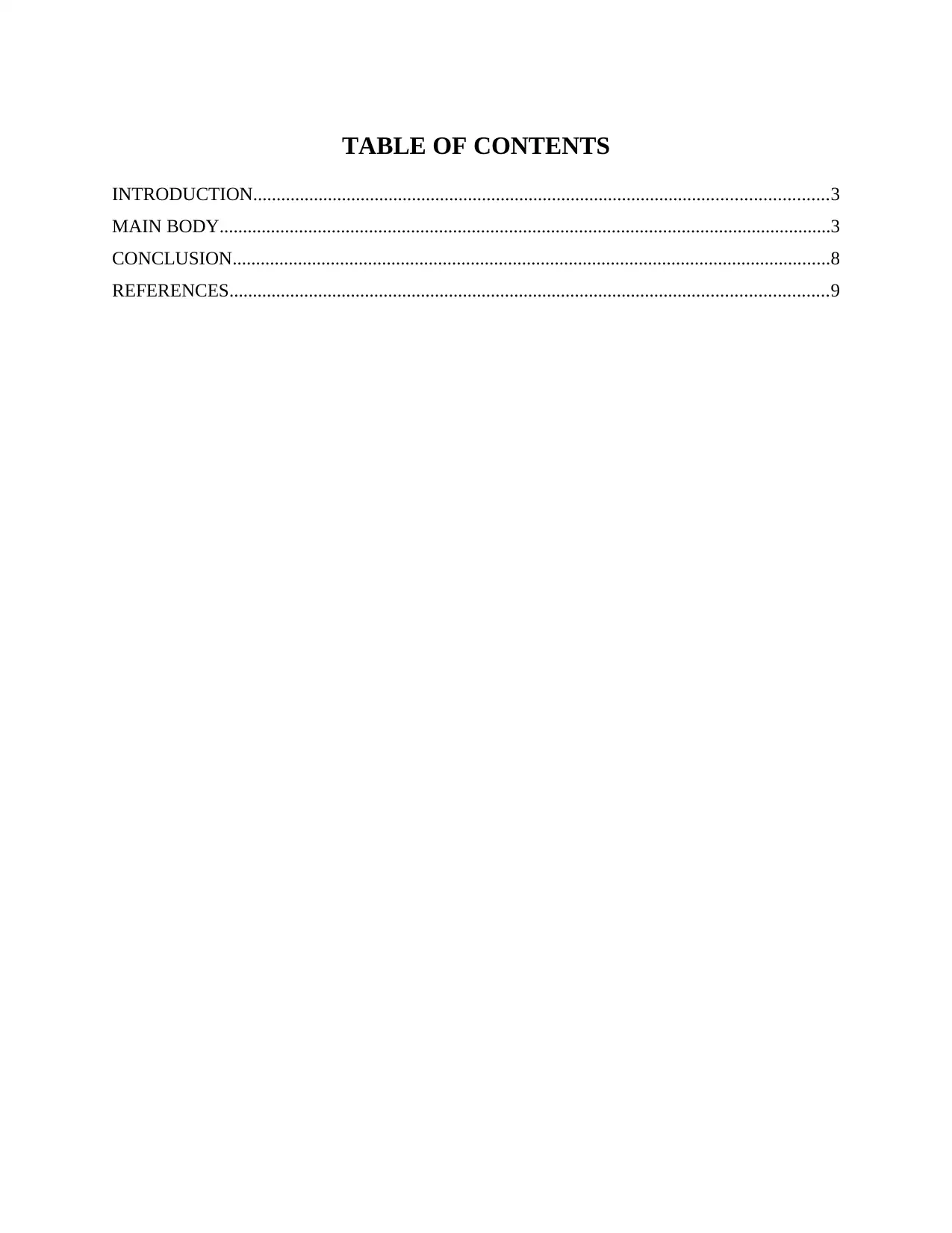
TABLE OF CONTENTS
INTRODUCTION...........................................................................................................................3
MAIN BODY...................................................................................................................................3
CONCLUSION................................................................................................................................8
REFERENCES................................................................................................................................9
INTRODUCTION...........................................................................................................................3
MAIN BODY...................................................................................................................................3
CONCLUSION................................................................................................................................8
REFERENCES................................................................................................................................9
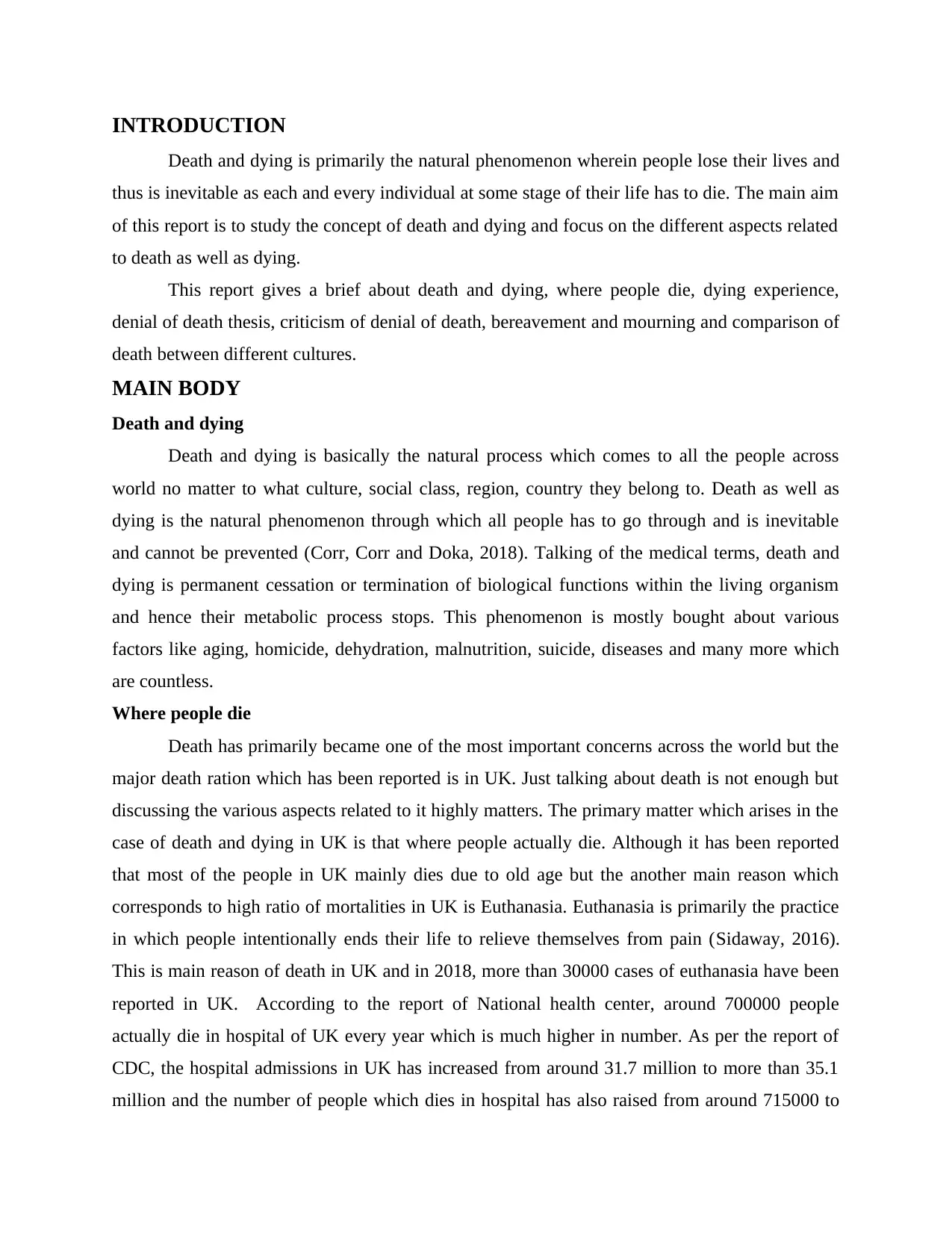
INTRODUCTION
Death and dying is primarily the natural phenomenon wherein people lose their lives and
thus is inevitable as each and every individual at some stage of their life has to die. The main aim
of this report is to study the concept of death and dying and focus on the different aspects related
to death as well as dying.
This report gives a brief about death and dying, where people die, dying experience,
denial of death thesis, criticism of denial of death, bereavement and mourning and comparison of
death between different cultures.
MAIN BODY
Death and dying
Death and dying is basically the natural process which comes to all the people across
world no matter to what culture, social class, region, country they belong to. Death as well as
dying is the natural phenomenon through which all people has to go through and is inevitable
and cannot be prevented (Corr, Corr and Doka, 2018). Talking of the medical terms, death and
dying is permanent cessation or termination of biological functions within the living organism
and hence their metabolic process stops. This phenomenon is mostly bought about various
factors like aging, homicide, dehydration, malnutrition, suicide, diseases and many more which
are countless.
Where people die
Death has primarily became one of the most important concerns across the world but the
major death ration which has been reported is in UK. Just talking about death is not enough but
discussing the various aspects related to it highly matters. The primary matter which arises in the
case of death and dying in UK is that where people actually die. Although it has been reported
that most of the people in UK mainly dies due to old age but the another main reason which
corresponds to high ratio of mortalities in UK is Euthanasia. Euthanasia is primarily the practice
in which people intentionally ends their life to relieve themselves from pain (Sidaway, 2016).
This is main reason of death in UK and in 2018, more than 30000 cases of euthanasia have been
reported in UK. According to the report of National health center, around 700000 people
actually die in hospital of UK every year which is much higher in number. As per the report of
CDC, the hospital admissions in UK has increased from around 31.7 million to more than 35.1
million and the number of people which dies in hospital has also raised from around 715000 to
Death and dying is primarily the natural phenomenon wherein people lose their lives and
thus is inevitable as each and every individual at some stage of their life has to die. The main aim
of this report is to study the concept of death and dying and focus on the different aspects related
to death as well as dying.
This report gives a brief about death and dying, where people die, dying experience,
denial of death thesis, criticism of denial of death, bereavement and mourning and comparison of
death between different cultures.
MAIN BODY
Death and dying
Death and dying is basically the natural process which comes to all the people across
world no matter to what culture, social class, region, country they belong to. Death as well as
dying is the natural phenomenon through which all people has to go through and is inevitable
and cannot be prevented (Corr, Corr and Doka, 2018). Talking of the medical terms, death and
dying is permanent cessation or termination of biological functions within the living organism
and hence their metabolic process stops. This phenomenon is mostly bought about various
factors like aging, homicide, dehydration, malnutrition, suicide, diseases and many more which
are countless.
Where people die
Death has primarily became one of the most important concerns across the world but the
major death ration which has been reported is in UK. Just talking about death is not enough but
discussing the various aspects related to it highly matters. The primary matter which arises in the
case of death and dying in UK is that where people actually die. Although it has been reported
that most of the people in UK mainly dies due to old age but the another main reason which
corresponds to high ratio of mortalities in UK is Euthanasia. Euthanasia is primarily the practice
in which people intentionally ends their life to relieve themselves from pain (Sidaway, 2016).
This is main reason of death in UK and in 2018, more than 30000 cases of euthanasia have been
reported in UK. According to the report of National health center, around 700000 people
actually die in hospital of UK every year which is much higher in number. As per the report of
CDC, the hospital admissions in UK has increased from around 31.7 million to more than 35.1
million and the number of people which dies in hospital has also raised from around 715000 to
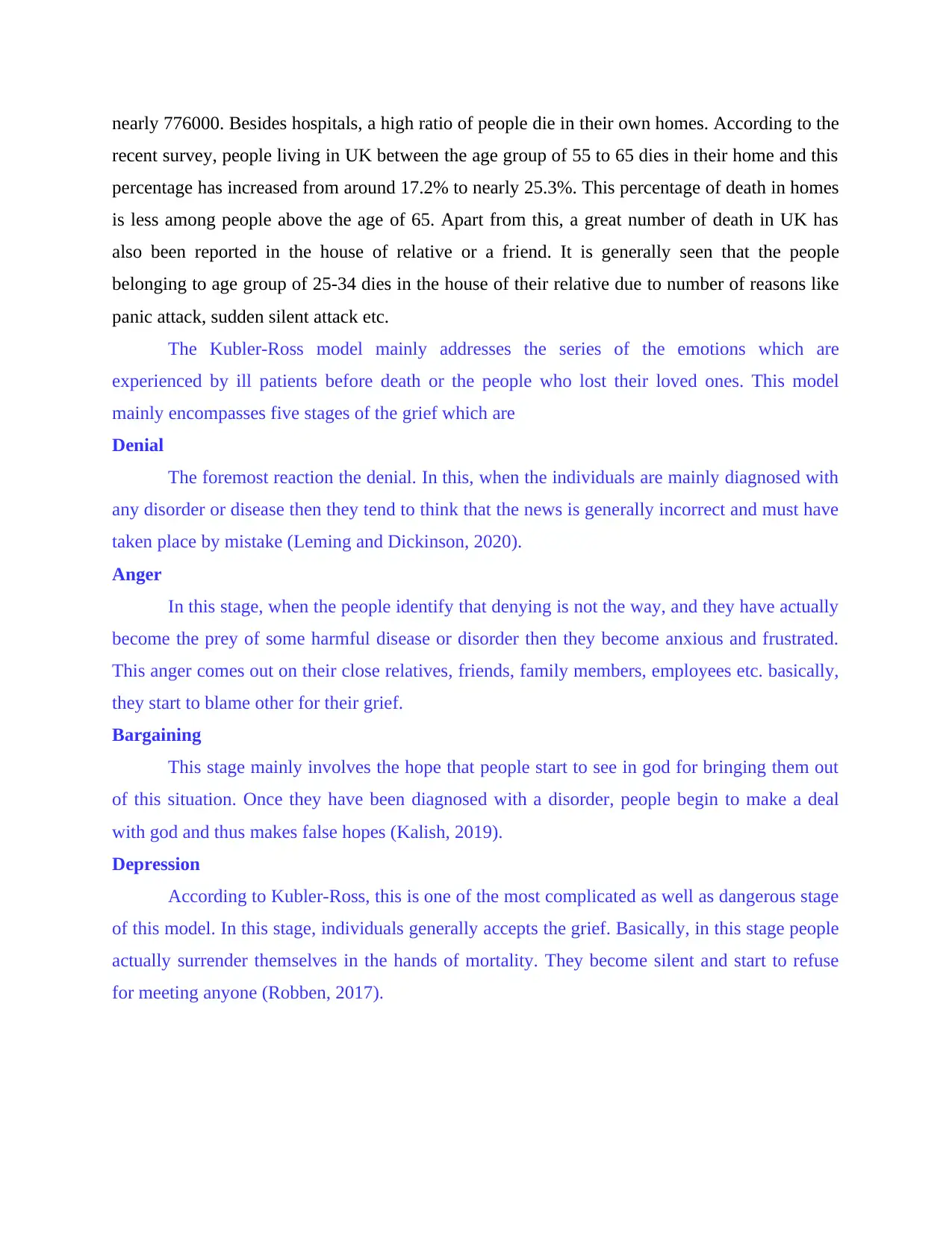
nearly 776000. Besides hospitals, a high ratio of people die in their own homes. According to the
recent survey, people living in UK between the age group of 55 to 65 dies in their home and this
percentage has increased from around 17.2% to nearly 25.3%. This percentage of death in homes
is less among people above the age of 65. Apart from this, a great number of death in UK has
also been reported in the house of relative or a friend. It is generally seen that the people
belonging to age group of 25-34 dies in the house of their relative due to number of reasons like
panic attack, sudden silent attack etc.
The Kubler-Ross model mainly addresses the series of the emotions which are
experienced by ill patients before death or the people who lost their loved ones. This model
mainly encompasses five stages of the grief which are
Denial
The foremost reaction the denial. In this, when the individuals are mainly diagnosed with
any disorder or disease then they tend to think that the news is generally incorrect and must have
taken place by mistake (Leming and Dickinson, 2020).
Anger
In this stage, when the people identify that denying is not the way, and they have actually
become the prey of some harmful disease or disorder then they become anxious and frustrated.
This anger comes out on their close relatives, friends, family members, employees etc. basically,
they start to blame other for their grief.
Bargaining
This stage mainly involves the hope that people start to see in god for bringing them out
of this situation. Once they have been diagnosed with a disorder, people begin to make a deal
with god and thus makes false hopes (Kalish, 2019).
Depression
According to Kubler-Ross, this is one of the most complicated as well as dangerous stage
of this model. In this stage, individuals generally accepts the grief. Basically, in this stage people
actually surrender themselves in the hands of mortality. They become silent and start to refuse
for meeting anyone (Robben, 2017).
recent survey, people living in UK between the age group of 55 to 65 dies in their home and this
percentage has increased from around 17.2% to nearly 25.3%. This percentage of death in homes
is less among people above the age of 65. Apart from this, a great number of death in UK has
also been reported in the house of relative or a friend. It is generally seen that the people
belonging to age group of 25-34 dies in the house of their relative due to number of reasons like
panic attack, sudden silent attack etc.
The Kubler-Ross model mainly addresses the series of the emotions which are
experienced by ill patients before death or the people who lost their loved ones. This model
mainly encompasses five stages of the grief which are
Denial
The foremost reaction the denial. In this, when the individuals are mainly diagnosed with
any disorder or disease then they tend to think that the news is generally incorrect and must have
taken place by mistake (Leming and Dickinson, 2020).
Anger
In this stage, when the people identify that denying is not the way, and they have actually
become the prey of some harmful disease or disorder then they become anxious and frustrated.
This anger comes out on their close relatives, friends, family members, employees etc. basically,
they start to blame other for their grief.
Bargaining
This stage mainly involves the hope that people start to see in god for bringing them out
of this situation. Once they have been diagnosed with a disorder, people begin to make a deal
with god and thus makes false hopes (Kalish, 2019).
Depression
According to Kubler-Ross, this is one of the most complicated as well as dangerous stage
of this model. In this stage, individuals generally accepts the grief. Basically, in this stage people
actually surrender themselves in the hands of mortality. They become silent and start to refuse
for meeting anyone (Robben, 2017).
Secure Best Marks with AI Grader
Need help grading? Try our AI Grader for instant feedback on your assignments.
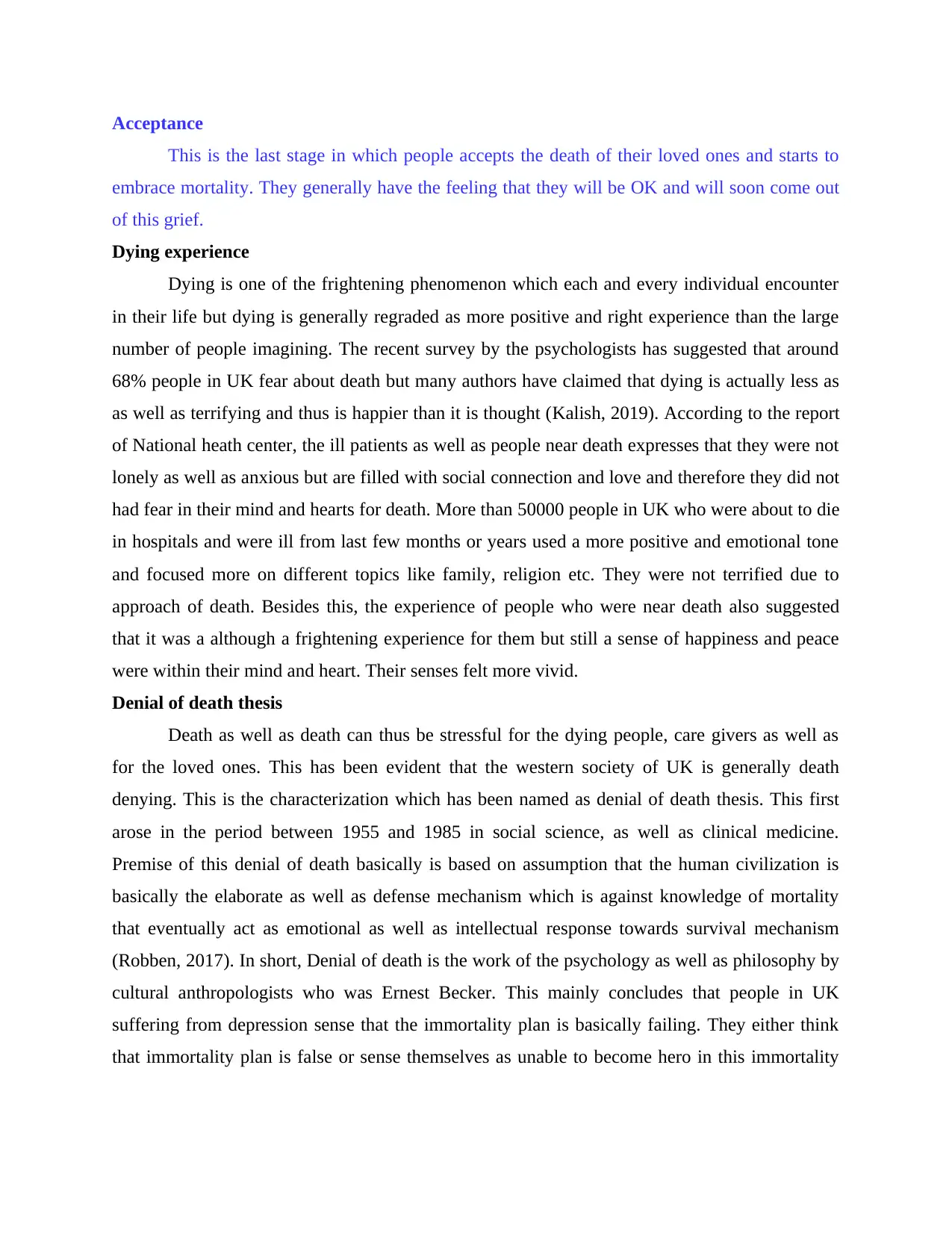
Acceptance
This is the last stage in which people accepts the death of their loved ones and starts to
embrace mortality. They generally have the feeling that they will be OK and will soon come out
of this grief.
Dying experience
Dying is one of the frightening phenomenon which each and every individual encounter
in their life but dying is generally regraded as more positive and right experience than the large
number of people imagining. The recent survey by the psychologists has suggested that around
68% people in UK fear about death but many authors have claimed that dying is actually less as
as well as terrifying and thus is happier than it is thought (Kalish, 2019). According to the report
of National heath center, the ill patients as well as people near death expresses that they were not
lonely as well as anxious but are filled with social connection and love and therefore they did not
had fear in their mind and hearts for death. More than 50000 people in UK who were about to die
in hospitals and were ill from last few months or years used a more positive and emotional tone
and focused more on different topics like family, religion etc. They were not terrified due to
approach of death. Besides this, the experience of people who were near death also suggested
that it was a although a frightening experience for them but still a sense of happiness and peace
were within their mind and heart. Their senses felt more vivid.
Denial of death thesis
Death as well as death can thus be stressful for the dying people, care givers as well as
for the loved ones. This has been evident that the western society of UK is generally death
denying. This is the characterization which has been named as denial of death thesis. This first
arose in the period between 1955 and 1985 in social science, as well as clinical medicine.
Premise of this denial of death basically is based on assumption that the human civilization is
basically the elaborate as well as defense mechanism which is against knowledge of mortality
that eventually act as emotional as well as intellectual response towards survival mechanism
(Robben, 2017). In short, Denial of death is the work of the psychology as well as philosophy by
cultural anthropologists who was Ernest Becker. This mainly concludes that people in UK
suffering from depression sense that the immortality plan is basically failing. They either think
that immortality plan is false or sense themselves as unable to become hero in this immortality
This is the last stage in which people accepts the death of their loved ones and starts to
embrace mortality. They generally have the feeling that they will be OK and will soon come out
of this grief.
Dying experience
Dying is one of the frightening phenomenon which each and every individual encounter
in their life but dying is generally regraded as more positive and right experience than the large
number of people imagining. The recent survey by the psychologists has suggested that around
68% people in UK fear about death but many authors have claimed that dying is actually less as
as well as terrifying and thus is happier than it is thought (Kalish, 2019). According to the report
of National heath center, the ill patients as well as people near death expresses that they were not
lonely as well as anxious but are filled with social connection and love and therefore they did not
had fear in their mind and hearts for death. More than 50000 people in UK who were about to die
in hospitals and were ill from last few months or years used a more positive and emotional tone
and focused more on different topics like family, religion etc. They were not terrified due to
approach of death. Besides this, the experience of people who were near death also suggested
that it was a although a frightening experience for them but still a sense of happiness and peace
were within their mind and heart. Their senses felt more vivid.
Denial of death thesis
Death as well as death can thus be stressful for the dying people, care givers as well as
for the loved ones. This has been evident that the western society of UK is generally death
denying. This is the characterization which has been named as denial of death thesis. This first
arose in the period between 1955 and 1985 in social science, as well as clinical medicine.
Premise of this denial of death basically is based on assumption that the human civilization is
basically the elaborate as well as defense mechanism which is against knowledge of mortality
that eventually act as emotional as well as intellectual response towards survival mechanism
(Robben, 2017). In short, Denial of death is the work of the psychology as well as philosophy by
cultural anthropologists who was Ernest Becker. This mainly concludes that people in UK
suffering from depression sense that the immortality plan is basically failing. They either think
that immortality plan is false or sense themselves as unable to become hero in this immortality
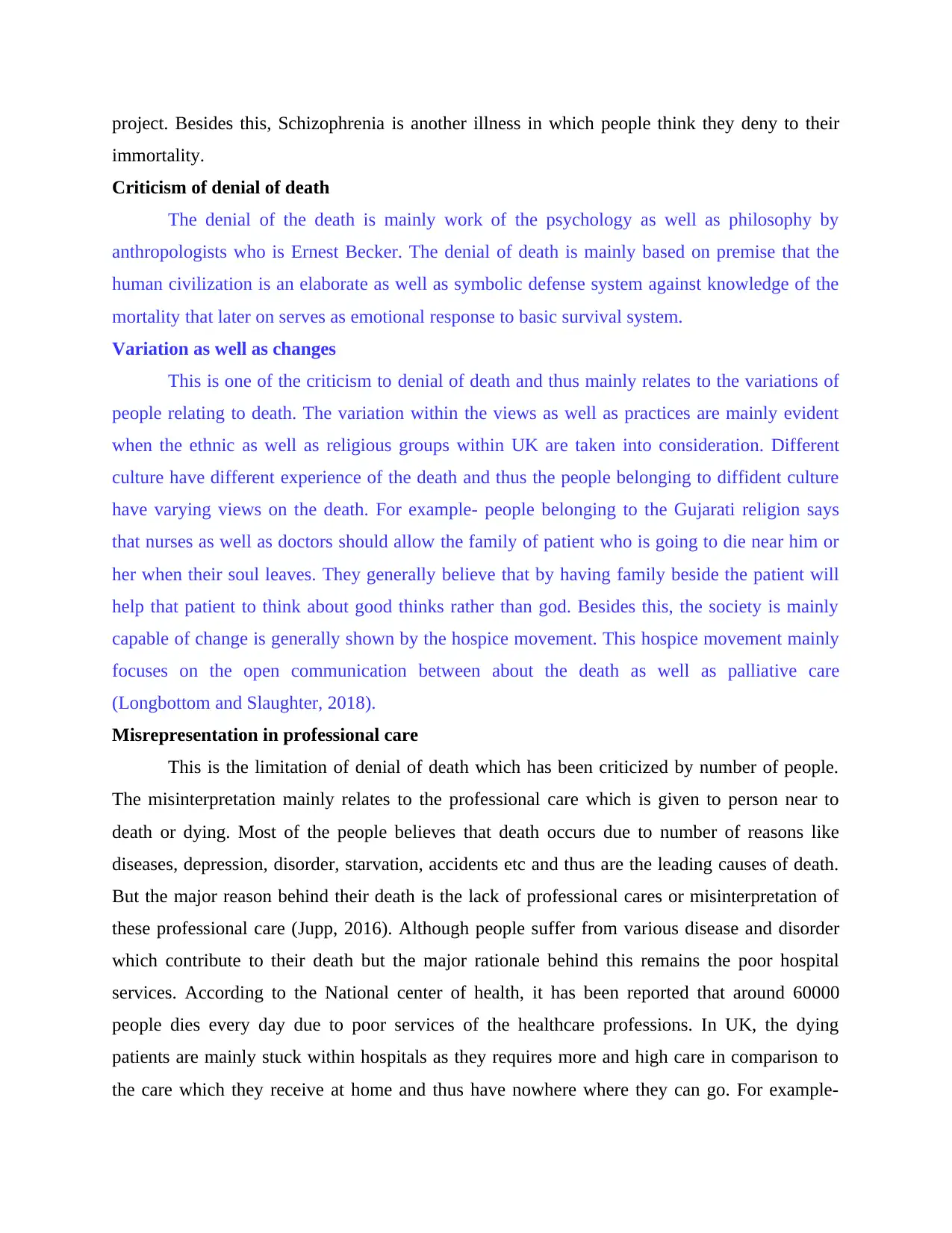
project. Besides this, Schizophrenia is another illness in which people think they deny to their
immortality.
Criticism of denial of death
The denial of the death is mainly work of the psychology as well as philosophy by
anthropologists who is Ernest Becker. The denial of death is mainly based on premise that the
human civilization is an elaborate as well as symbolic defense system against knowledge of the
mortality that later on serves as emotional response to basic survival system.
Variation as well as changes
This is one of the criticism to denial of death and thus mainly relates to the variations of
people relating to death. The variation within the views as well as practices are mainly evident
when the ethnic as well as religious groups within UK are taken into consideration. Different
culture have different experience of the death and thus the people belonging to diffident culture
have varying views on the death. For example- people belonging to the Gujarati religion says
that nurses as well as doctors should allow the family of patient who is going to die near him or
her when their soul leaves. They generally believe that by having family beside the patient will
help that patient to think about good thinks rather than god. Besides this, the society is mainly
capable of change is generally shown by the hospice movement. This hospice movement mainly
focuses on the open communication between about the death as well as palliative care
(Longbottom and Slaughter, 2018).
Misrepresentation in professional care
This is the limitation of denial of death which has been criticized by number of people.
The misinterpretation mainly relates to the professional care which is given to person near to
death or dying. Most of the people believes that death occurs due to number of reasons like
diseases, depression, disorder, starvation, accidents etc and thus are the leading causes of death.
But the major reason behind their death is the lack of professional cares or misinterpretation of
these professional care (Jupp, 2016). Although people suffer from various disease and disorder
which contribute to their death but the major rationale behind this remains the poor hospital
services. According to the National center of health, it has been reported that around 60000
people dies every day due to poor services of the healthcare professions. In UK, the dying
patients are mainly stuck within hospitals as they requires more and high care in comparison to
the care which they receive at home and thus have nowhere where they can go. For example-
immortality.
Criticism of denial of death
The denial of the death is mainly work of the psychology as well as philosophy by
anthropologists who is Ernest Becker. The denial of death is mainly based on premise that the
human civilization is an elaborate as well as symbolic defense system against knowledge of the
mortality that later on serves as emotional response to basic survival system.
Variation as well as changes
This is one of the criticism to denial of death and thus mainly relates to the variations of
people relating to death. The variation within the views as well as practices are mainly evident
when the ethnic as well as religious groups within UK are taken into consideration. Different
culture have different experience of the death and thus the people belonging to diffident culture
have varying views on the death. For example- people belonging to the Gujarati religion says
that nurses as well as doctors should allow the family of patient who is going to die near him or
her when their soul leaves. They generally believe that by having family beside the patient will
help that patient to think about good thinks rather than god. Besides this, the society is mainly
capable of change is generally shown by the hospice movement. This hospice movement mainly
focuses on the open communication between about the death as well as palliative care
(Longbottom and Slaughter, 2018).
Misrepresentation in professional care
This is the limitation of denial of death which has been criticized by number of people.
The misinterpretation mainly relates to the professional care which is given to person near to
death or dying. Most of the people believes that death occurs due to number of reasons like
diseases, depression, disorder, starvation, accidents etc and thus are the leading causes of death.
But the major reason behind their death is the lack of professional cares or misinterpretation of
these professional care (Jupp, 2016). Although people suffer from various disease and disorder
which contribute to their death but the major rationale behind this remains the poor hospital
services. According to the National center of health, it has been reported that around 60000
people dies every day due to poor services of the healthcare professions. In UK, the dying
patients are mainly stuck within hospitals as they requires more and high care in comparison to
the care which they receive at home and thus have nowhere where they can go. For example-
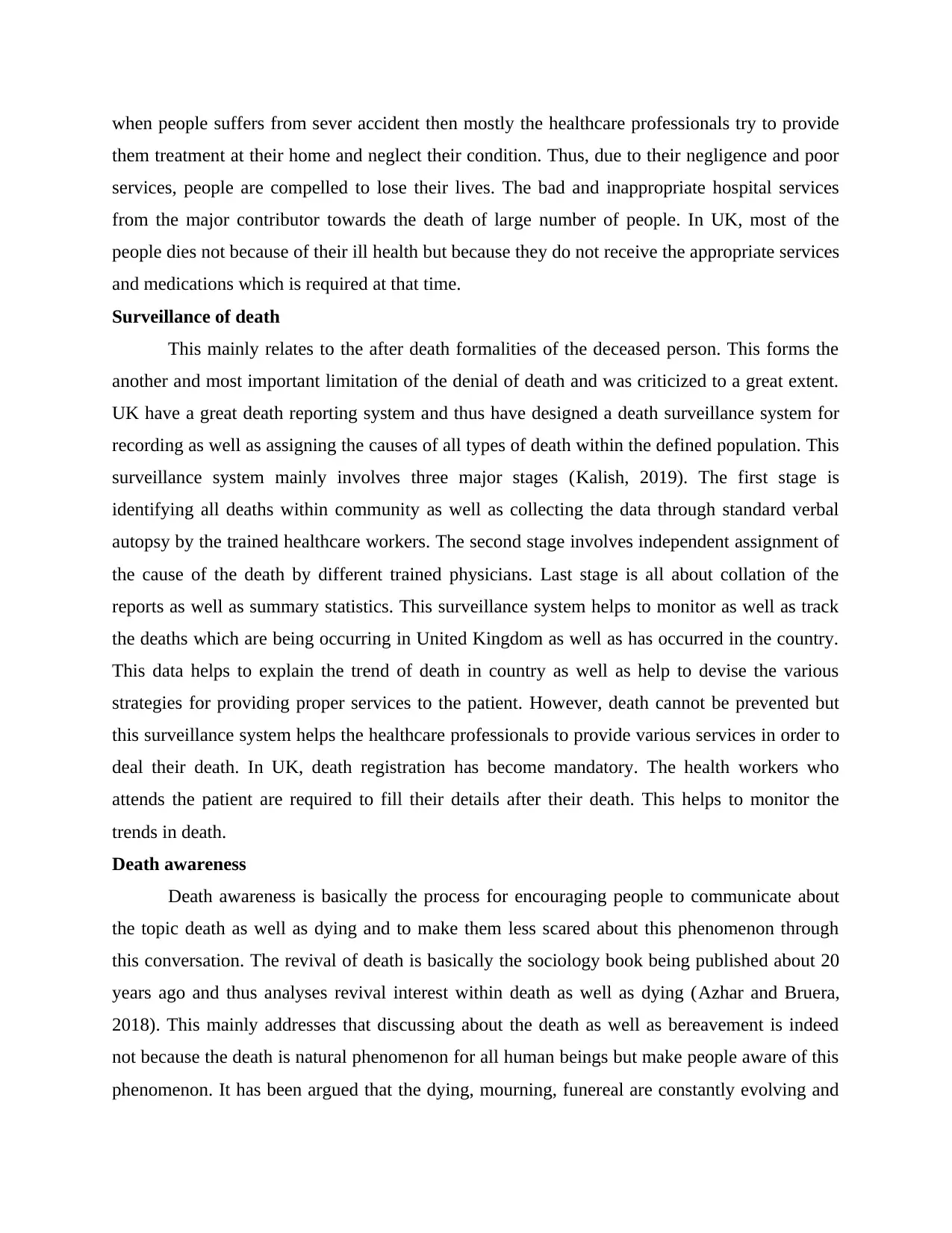
when people suffers from sever accident then mostly the healthcare professionals try to provide
them treatment at their home and neglect their condition. Thus, due to their negligence and poor
services, people are compelled to lose their lives. The bad and inappropriate hospital services
from the major contributor towards the death of large number of people. In UK, most of the
people dies not because of their ill health but because they do not receive the appropriate services
and medications which is required at that time.
Surveillance of death
This mainly relates to the after death formalities of the deceased person. This forms the
another and most important limitation of the denial of death and was criticized to a great extent.
UK have a great death reporting system and thus have designed a death surveillance system for
recording as well as assigning the causes of all types of death within the defined population. This
surveillance system mainly involves three major stages (Kalish, 2019). The first stage is
identifying all deaths within community as well as collecting the data through standard verbal
autopsy by the trained healthcare workers. The second stage involves independent assignment of
the cause of the death by different trained physicians. Last stage is all about collation of the
reports as well as summary statistics. This surveillance system helps to monitor as well as track
the deaths which are being occurring in United Kingdom as well as has occurred in the country.
This data helps to explain the trend of death in country as well as help to devise the various
strategies for providing proper services to the patient. However, death cannot be prevented but
this surveillance system helps the healthcare professionals to provide various services in order to
deal their death. In UK, death registration has become mandatory. The health workers who
attends the patient are required to fill their details after their death. This helps to monitor the
trends in death.
Death awareness
Death awareness is basically the process for encouraging people to communicate about
the topic death as well as dying and to make them less scared about this phenomenon through
this conversation. The revival of death is basically the sociology book being published about 20
years ago and thus analyses revival interest within death as well as dying (Azhar and Bruera,
2018). This mainly addresses that discussing about the death as well as bereavement is indeed
not because the death is natural phenomenon for all human beings but make people aware of this
phenomenon. It has been argued that the dying, mourning, funereal are constantly evolving and
them treatment at their home and neglect their condition. Thus, due to their negligence and poor
services, people are compelled to lose their lives. The bad and inappropriate hospital services
from the major contributor towards the death of large number of people. In UK, most of the
people dies not because of their ill health but because they do not receive the appropriate services
and medications which is required at that time.
Surveillance of death
This mainly relates to the after death formalities of the deceased person. This forms the
another and most important limitation of the denial of death and was criticized to a great extent.
UK have a great death reporting system and thus have designed a death surveillance system for
recording as well as assigning the causes of all types of death within the defined population. This
surveillance system mainly involves three major stages (Kalish, 2019). The first stage is
identifying all deaths within community as well as collecting the data through standard verbal
autopsy by the trained healthcare workers. The second stage involves independent assignment of
the cause of the death by different trained physicians. Last stage is all about collation of the
reports as well as summary statistics. This surveillance system helps to monitor as well as track
the deaths which are being occurring in United Kingdom as well as has occurred in the country.
This data helps to explain the trend of death in country as well as help to devise the various
strategies for providing proper services to the patient. However, death cannot be prevented but
this surveillance system helps the healthcare professionals to provide various services in order to
deal their death. In UK, death registration has become mandatory. The health workers who
attends the patient are required to fill their details after their death. This helps to monitor the
trends in death.
Death awareness
Death awareness is basically the process for encouraging people to communicate about
the topic death as well as dying and to make them less scared about this phenomenon through
this conversation. The revival of death is basically the sociology book being published about 20
years ago and thus analyses revival interest within death as well as dying (Azhar and Bruera,
2018). This mainly addresses that discussing about the death as well as bereavement is indeed
not because the death is natural phenomenon for all human beings but make people aware of this
phenomenon. It has been argued that the dying, mourning, funereal are constantly evolving and
Paraphrase This Document
Need a fresh take? Get an instant paraphrase of this document with our AI Paraphraser
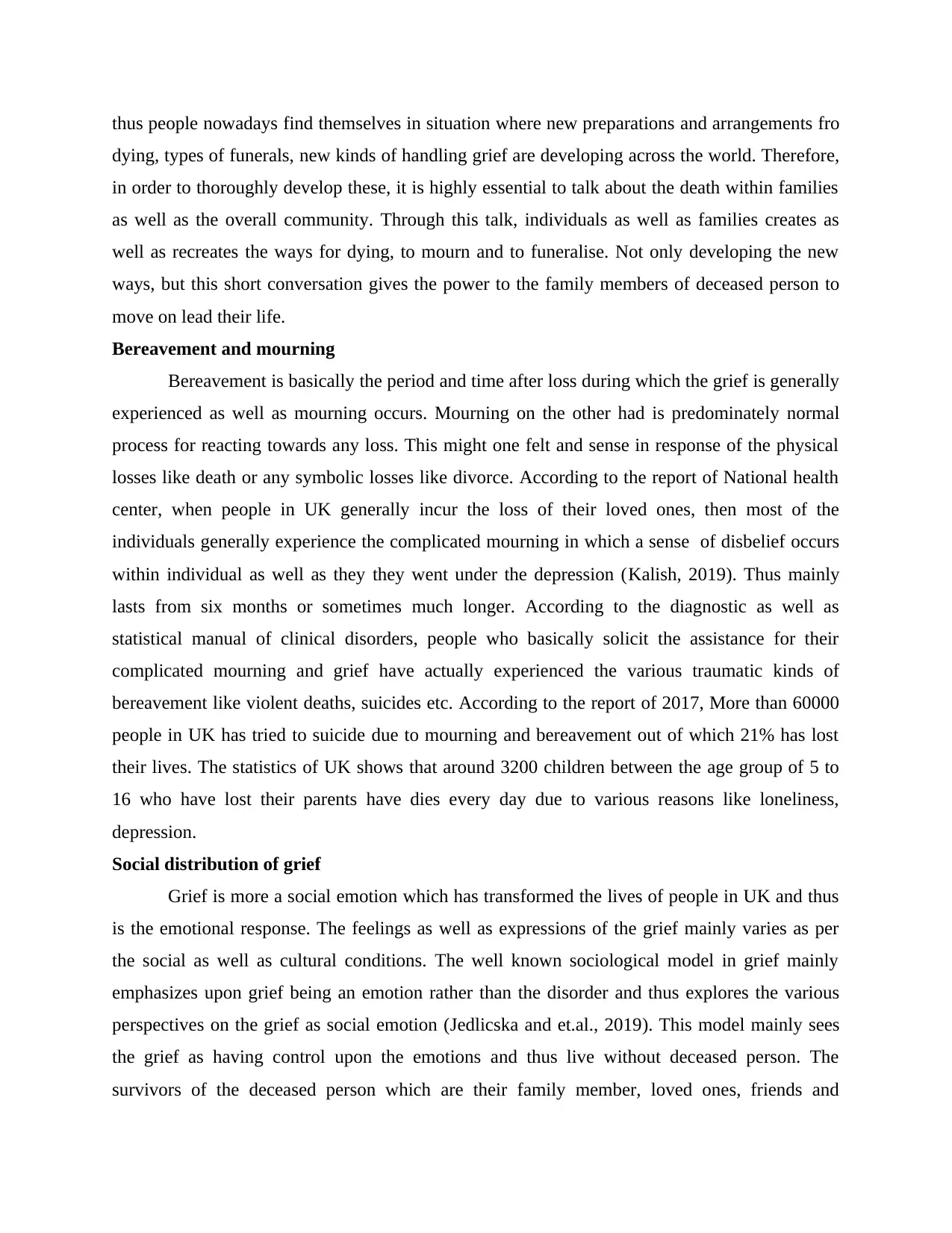
thus people nowadays find themselves in situation where new preparations and arrangements fro
dying, types of funerals, new kinds of handling grief are developing across the world. Therefore,
in order to thoroughly develop these, it is highly essential to talk about the death within families
as well as the overall community. Through this talk, individuals as well as families creates as
well as recreates the ways for dying, to mourn and to funeralise. Not only developing the new
ways, but this short conversation gives the power to the family members of deceased person to
move on lead their life.
Bereavement and mourning
Bereavement is basically the period and time after loss during which the grief is generally
experienced as well as mourning occurs. Mourning on the other had is predominately normal
process for reacting towards any loss. This might one felt and sense in response of the physical
losses like death or any symbolic losses like divorce. According to the report of National health
center, when people in UK generally incur the loss of their loved ones, then most of the
individuals generally experience the complicated mourning in which a sense of disbelief occurs
within individual as well as they they went under the depression (Kalish, 2019). Thus mainly
lasts from six months or sometimes much longer. According to the diagnostic as well as
statistical manual of clinical disorders, people who basically solicit the assistance for their
complicated mourning and grief have actually experienced the various traumatic kinds of
bereavement like violent deaths, suicides etc. According to the report of 2017, More than 60000
people in UK has tried to suicide due to mourning and bereavement out of which 21% has lost
their lives. The statistics of UK shows that around 3200 children between the age group of 5 to
16 who have lost their parents have dies every day due to various reasons like loneliness,
depression.
Social distribution of grief
Grief is more a social emotion which has transformed the lives of people in UK and thus
is the emotional response. The feelings as well as expressions of the grief mainly varies as per
the social as well as cultural conditions. The well known sociological model in grief mainly
emphasizes upon grief being an emotion rather than the disorder and thus explores the various
perspectives on the grief as social emotion (Jedlicska and et.al., 2019). This model mainly sees
the grief as having control upon the emotions and thus live without deceased person. The
survivors of the deceased person which are their family member, loved ones, friends and
dying, types of funerals, new kinds of handling grief are developing across the world. Therefore,
in order to thoroughly develop these, it is highly essential to talk about the death within families
as well as the overall community. Through this talk, individuals as well as families creates as
well as recreates the ways for dying, to mourn and to funeralise. Not only developing the new
ways, but this short conversation gives the power to the family members of deceased person to
move on lead their life.
Bereavement and mourning
Bereavement is basically the period and time after loss during which the grief is generally
experienced as well as mourning occurs. Mourning on the other had is predominately normal
process for reacting towards any loss. This might one felt and sense in response of the physical
losses like death or any symbolic losses like divorce. According to the report of National health
center, when people in UK generally incur the loss of their loved ones, then most of the
individuals generally experience the complicated mourning in which a sense of disbelief occurs
within individual as well as they they went under the depression (Kalish, 2019). Thus mainly
lasts from six months or sometimes much longer. According to the diagnostic as well as
statistical manual of clinical disorders, people who basically solicit the assistance for their
complicated mourning and grief have actually experienced the various traumatic kinds of
bereavement like violent deaths, suicides etc. According to the report of 2017, More than 60000
people in UK has tried to suicide due to mourning and bereavement out of which 21% has lost
their lives. The statistics of UK shows that around 3200 children between the age group of 5 to
16 who have lost their parents have dies every day due to various reasons like loneliness,
depression.
Social distribution of grief
Grief is more a social emotion which has transformed the lives of people in UK and thus
is the emotional response. The feelings as well as expressions of the grief mainly varies as per
the social as well as cultural conditions. The well known sociological model in grief mainly
emphasizes upon grief being an emotion rather than the disorder and thus explores the various
perspectives on the grief as social emotion (Jedlicska and et.al., 2019). This model mainly sees
the grief as having control upon the emotions and thus live without deceased person. The
survivors of the deceased person which are their family member, loved ones, friends and
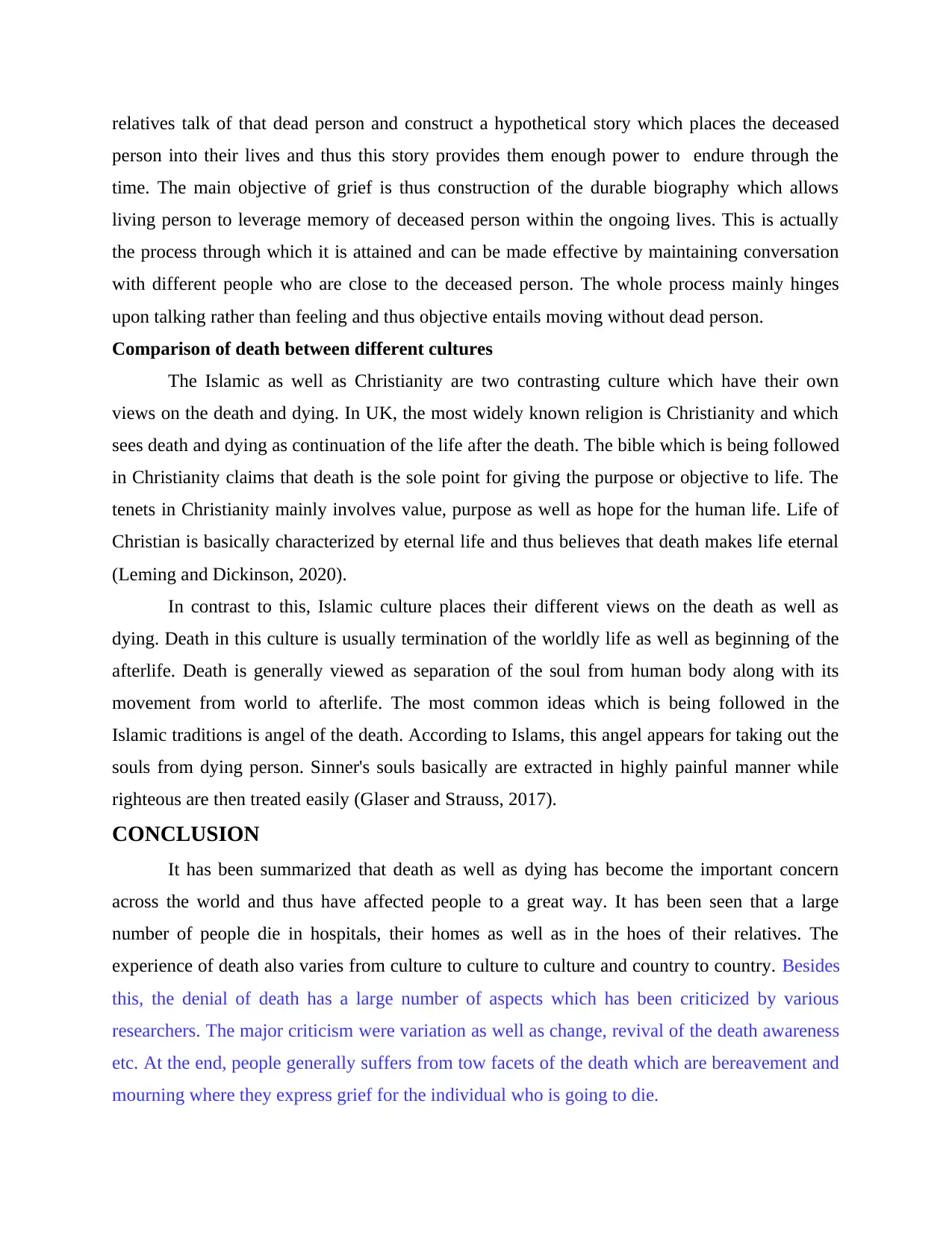
relatives talk of that dead person and construct a hypothetical story which places the deceased
person into their lives and thus this story provides them enough power to endure through the
time. The main objective of grief is thus construction of the durable biography which allows
living person to leverage memory of deceased person within the ongoing lives. This is actually
the process through which it is attained and can be made effective by maintaining conversation
with different people who are close to the deceased person. The whole process mainly hinges
upon talking rather than feeling and thus objective entails moving without dead person.
Comparison of death between different cultures
The Islamic as well as Christianity are two contrasting culture which have their own
views on the death and dying. In UK, the most widely known religion is Christianity and which
sees death and dying as continuation of the life after the death. The bible which is being followed
in Christianity claims that death is the sole point for giving the purpose or objective to life. The
tenets in Christianity mainly involves value, purpose as well as hope for the human life. Life of
Christian is basically characterized by eternal life and thus believes that death makes life eternal
(Leming and Dickinson, 2020).
In contrast to this, Islamic culture places their different views on the death as well as
dying. Death in this culture is usually termination of the worldly life as well as beginning of the
afterlife. Death is generally viewed as separation of the soul from human body along with its
movement from world to afterlife. The most common ideas which is being followed in the
Islamic traditions is angel of the death. According to Islams, this angel appears for taking out the
souls from dying person. Sinner's souls basically are extracted in highly painful manner while
righteous are then treated easily (Glaser and Strauss, 2017).
CONCLUSION
It has been summarized that death as well as dying has become the important concern
across the world and thus have affected people to a great way. It has been seen that a large
number of people die in hospitals, their homes as well as in the hoes of their relatives. The
experience of death also varies from culture to culture to culture and country to country. Besides
this, the denial of death has a large number of aspects which has been criticized by various
researchers. The major criticism were variation as well as change, revival of the death awareness
etc. At the end, people generally suffers from tow facets of the death which are bereavement and
mourning where they express grief for the individual who is going to die.
person into their lives and thus this story provides them enough power to endure through the
time. The main objective of grief is thus construction of the durable biography which allows
living person to leverage memory of deceased person within the ongoing lives. This is actually
the process through which it is attained and can be made effective by maintaining conversation
with different people who are close to the deceased person. The whole process mainly hinges
upon talking rather than feeling and thus objective entails moving without dead person.
Comparison of death between different cultures
The Islamic as well as Christianity are two contrasting culture which have their own
views on the death and dying. In UK, the most widely known religion is Christianity and which
sees death and dying as continuation of the life after the death. The bible which is being followed
in Christianity claims that death is the sole point for giving the purpose or objective to life. The
tenets in Christianity mainly involves value, purpose as well as hope for the human life. Life of
Christian is basically characterized by eternal life and thus believes that death makes life eternal
(Leming and Dickinson, 2020).
In contrast to this, Islamic culture places their different views on the death as well as
dying. Death in this culture is usually termination of the worldly life as well as beginning of the
afterlife. Death is generally viewed as separation of the soul from human body along with its
movement from world to afterlife. The most common ideas which is being followed in the
Islamic traditions is angel of the death. According to Islams, this angel appears for taking out the
souls from dying person. Sinner's souls basically are extracted in highly painful manner while
righteous are then treated easily (Glaser and Strauss, 2017).
CONCLUSION
It has been summarized that death as well as dying has become the important concern
across the world and thus have affected people to a great way. It has been seen that a large
number of people die in hospitals, their homes as well as in the hoes of their relatives. The
experience of death also varies from culture to culture to culture and country to country. Besides
this, the denial of death has a large number of aspects which has been criticized by various
researchers. The major criticism were variation as well as change, revival of the death awareness
etc. At the end, people generally suffers from tow facets of the death which are bereavement and
mourning where they express grief for the individual who is going to die.
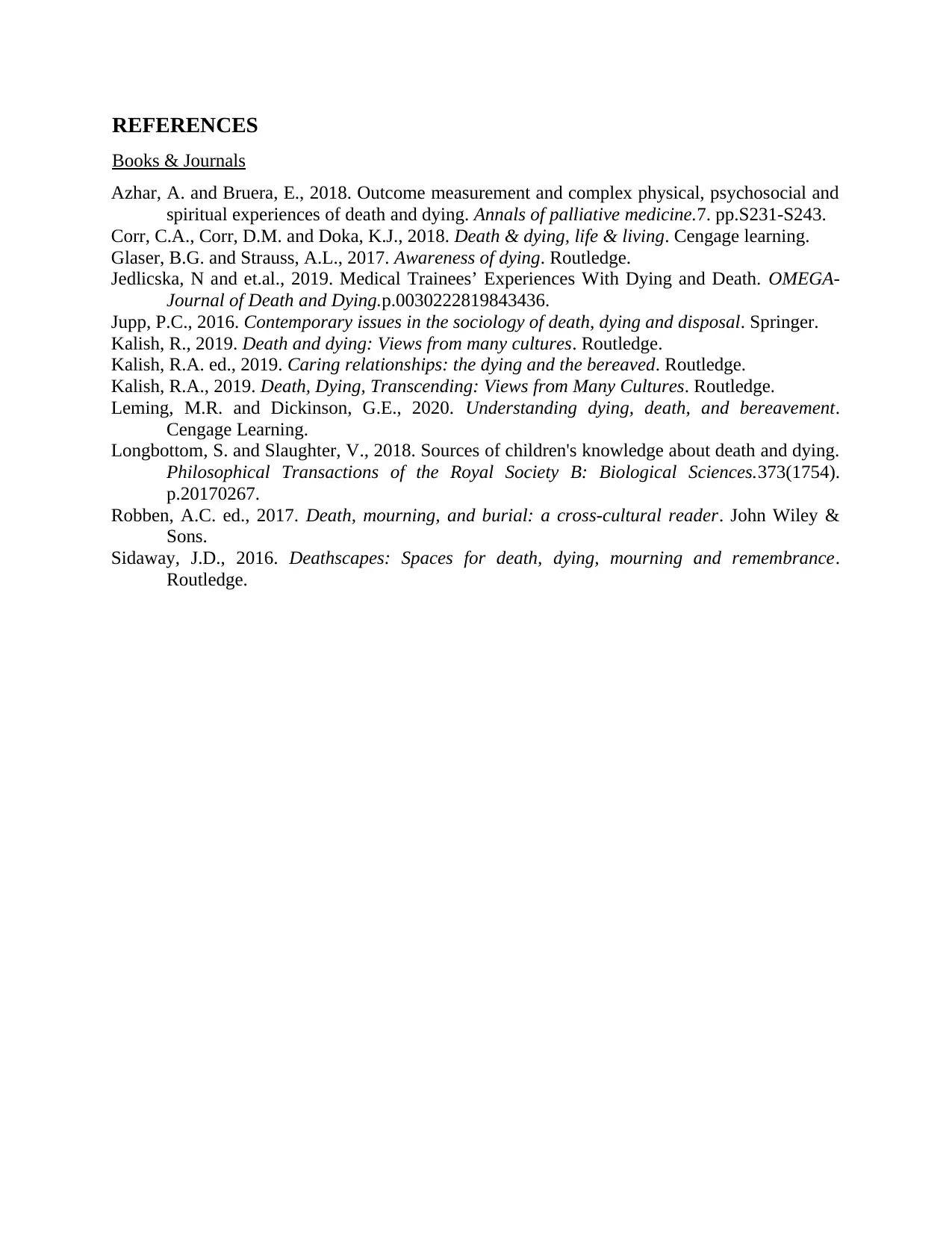
REFERENCES
Books & Journals
Azhar, A. and Bruera, E., 2018. Outcome measurement and complex physical, psychosocial and
spiritual experiences of death and dying. Annals of palliative medicine.7. pp.S231-S243.
Corr, C.A., Corr, D.M. and Doka, K.J., 2018. Death & dying, life & living. Cengage learning.
Glaser, B.G. and Strauss, A.L., 2017. Awareness of dying. Routledge.
Jedlicska, N and et.al., 2019. Medical Trainees’ Experiences With Dying and Death. OMEGA-
Journal of Death and Dying.p.0030222819843436.
Jupp, P.C., 2016. Contemporary issues in the sociology of death, dying and disposal. Springer.
Kalish, R., 2019. Death and dying: Views from many cultures. Routledge.
Kalish, R.A. ed., 2019. Caring relationships: the dying and the bereaved. Routledge.
Kalish, R.A., 2019. Death, Dying, Transcending: Views from Many Cultures. Routledge.
Leming, M.R. and Dickinson, G.E., 2020. Understanding dying, death, and bereavement.
Cengage Learning.
Longbottom, S. and Slaughter, V., 2018. Sources of children's knowledge about death and dying.
Philosophical Transactions of the Royal Society B: Biological Sciences.373(1754).
p.20170267.
Robben, A.C. ed., 2017. Death, mourning, and burial: a cross-cultural reader. John Wiley &
Sons.
Sidaway, J.D., 2016. Deathscapes: Spaces for death, dying, mourning and remembrance.
Routledge.
Books & Journals
Azhar, A. and Bruera, E., 2018. Outcome measurement and complex physical, psychosocial and
spiritual experiences of death and dying. Annals of palliative medicine.7. pp.S231-S243.
Corr, C.A., Corr, D.M. and Doka, K.J., 2018. Death & dying, life & living. Cengage learning.
Glaser, B.G. and Strauss, A.L., 2017. Awareness of dying. Routledge.
Jedlicska, N and et.al., 2019. Medical Trainees’ Experiences With Dying and Death. OMEGA-
Journal of Death and Dying.p.0030222819843436.
Jupp, P.C., 2016. Contemporary issues in the sociology of death, dying and disposal. Springer.
Kalish, R., 2019. Death and dying: Views from many cultures. Routledge.
Kalish, R.A. ed., 2019. Caring relationships: the dying and the bereaved. Routledge.
Kalish, R.A., 2019. Death, Dying, Transcending: Views from Many Cultures. Routledge.
Leming, M.R. and Dickinson, G.E., 2020. Understanding dying, death, and bereavement.
Cengage Learning.
Longbottom, S. and Slaughter, V., 2018. Sources of children's knowledge about death and dying.
Philosophical Transactions of the Royal Society B: Biological Sciences.373(1754).
p.20170267.
Robben, A.C. ed., 2017. Death, mourning, and burial: a cross-cultural reader. John Wiley &
Sons.
Sidaway, J.D., 2016. Deathscapes: Spaces for death, dying, mourning and remembrance.
Routledge.
Secure Best Marks with AI Grader
Need help grading? Try our AI Grader for instant feedback on your assignments.

1 out of 11
Related Documents
Your All-in-One AI-Powered Toolkit for Academic Success.
+13062052269
info@desklib.com
Available 24*7 on WhatsApp / Email
![[object Object]](/_next/static/media/star-bottom.7253800d.svg)
Unlock your academic potential
© 2024 | Zucol Services PVT LTD | All rights reserved.





